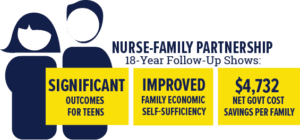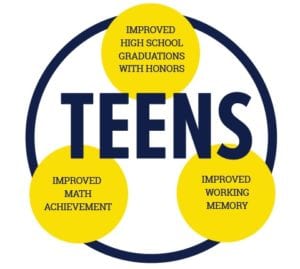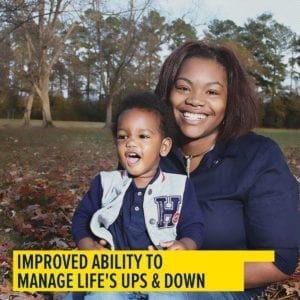HOW ARE THEY NOW?
18-year follow-up on Memphis families

Pediatrics – a leading, peer-reviewed journal of the American Academy of Pediatrics – published an 18-year follow-up of moms and children in Nurse-Family Partnership’s Memphis trial. This follow-up study found that Nurse-Family Partnership significantly improved the cognitive functioning and academic performance of 18-year old youth born to high-risk mothers with limited psychological resources to cope with poverty. An additional Pediatrics study, over the same 18-year period, found that Nurse-Family Partnership saved government $17,310 per family in public benefit costs, resulting in a net savings of $4,732 in government costs in 2009 dollars. The reduction in public benefit costs was explained in part by nurse-visited mothers better planning subsequent pregnancies.
Beginning in 1990, this study enrolled primarily African-American women with high-risk characteristics: two-thirds were under 18, 85% were living in households below the federal poverty level and in highly-disadvantaged neighborhoods in Memphis, TN. Both studies had high retention rates, which contribute to the validity of the findings.
“It’s rare for studies of early invention programs to examine early-intervention effects over an 18-year period,” said David Olds, PhD. “This new evidence shows promise that Nurse-Family Partnership’s effects may carry over into adulthood.”
IMPROVED TEEN OUTCOMES

Children, whose mothers had an NFP Nurse, had improved cognitive outcomes compared to children in the control group. These benefits were observed for the children children born to high-risk mothers with limited psychological resources to cope with poverty, that is, those with lower intellectual functioning, mental health and sense of mastery.
The outcomes for youth at age 18 included:
- improved math achievement scores
- receptive language abilities
- working memory
- ability to accurately read others’ emotions
In addition, the nurse-visited children were three times as likely to graduate from high school with honors compared to the control group. Also, at age 18, the proportion of nurse-visited children receiving supplemental security income (SSI) for disability was 64.2% lower than that of the control group.
Moreover, nurse-visited female children born to all mothers participating in Nurse-Family Partnership, as a trend, had fewer convictions at age 18 than female children in the control group (an effect also observed for 19-year-old females in a previous randomized clinical trial of the program in Elmira, N.Y). There were no other beneficial effects of the program on children’s behavioral health.
IMPROVED ECONOMIC SELF-SUFFICIENCY OUTCOMES

Nurse-visited mothers reported:
- A greater ability to manage the challenges in their lives.
- Higher rates of marriage. The proportion of nurse-visited women who were married was 30% higher than the control group.
- Higher rates of living with their partner (as a trend).
- Improved financial support outcomes, including spouses who were employed 14 months longer than those in the control group.
- There were NO other program effects on maternal self-reported behavioral health.
“We know that mothers participating in Nurse-Family Partnership truly changed the life course for themselves and their children,” said Frank Daidone, president and CEO of Nurse-Family Partnership. “There’s no better public investment – than investing in building stronger families.”
COST SAVINGS
 The evaluation of Nurse-Family Partnership measures the cost savings to government in reduced public benefits over an 18-year period. NFP saved the government $17,310 per family in reduced public benefits and resulted in a net savings of $4,732 in 2009 dollars. This represents a 9.0% reduction in public benefit per family.
The evaluation of Nurse-Family Partnership measures the cost savings to government in reduced public benefits over an 18-year period. NFP saved the government $17,310 per family in reduced public benefits and resulted in a net savings of $4,732 in 2009 dollars. This represents a 9.0% reduction in public benefit per family.
- This high savings came from reduced costs of Medicaid, the Supplemental Nutrition Assistance Program (SNAP) and welfare cash assistance. The reduction in public benefit costs was explained in part by nurse-visited mothers better planning subsequent pregnancies.
- This savings is consistent with earlier reports from the Memphis trial when the child was younger, which also found reductions in welfare use.
THE RESEARCH CONTINUES
Nurse-Family Partnership is committed to understanding the long-term effects of the program. These follow-up studies are the most recent reports from a series of randomized, clinical trials of Nurse-Family Partnership over the past four decades. Families in these trials are being followed over their life course to estimate Nurse-Family Partnership’s long-term effects – far beyond when the program ends at the first child’s second birthday.
Help us get the word out – use our Memphis Follow-Up Social Media Kit
Learn More
- Press release – Pediatrics Reports Nurse-Family Partnership Improves Youth Cognition and Academic Performance
- Journal study abstracts & David Old videos – Mothers Study and Youth Study [Note: you have to have a subscription to Pediatrics to access full article.]
- Nurse-Family Partnership Research Trials and Outcomes

